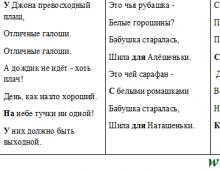Can colds be cured in the heat? Colds in summer: how to treat them correctly. Simple folk remedies for treating summer colds
A summer cold can overshadow a long-awaited vacation, when it’s time to bask in the sun rather than wrap yourself up in a warm blanket from the chill. Despite the fact that pathogenic pathogens of acute respiratory infections and acute respiratory viral infections are viable at any time of the year, it is in the summer that it is more difficult for a person to resist them.
Colds in the summer - we understand the reasons
According to doctors, the chances of catching a cold in summer are much greater than in winter. Oddly enough, the higher the thermometer, the greater the likelihood of getting sick. Why is this happening?
· Temperature changes are a common cause of summer colds. When it’s hot outside, you really want to quickly plunge into the saving coolness. Air conditioners in the room or inside the car can contribute to this. To prevent illness, it is recommended to set the temperature not much (about 4-5⁰ C) different from the street temperature. For a comfortable trip in the car, it is advisable to install the “climate control” option, which is automatically responsible for the most optimal conditions.
· You should also be wary of hypothermia while swimming, when the first warning sign is “goose bumps” and severe chills. You should not stay in the water for too long, even if it seems warm enough.
· A glass of ice-cold kvass and lemonade in the heat can lead to sore throat or laryngitis. To prevent this from happening, let the drink sit at room temperature and warm up at least a little. Drink in small sips or through a straw. You should also be careful with ice cream, chilled berries and fruits.
· Drafts, which are sometimes difficult to notice due to the intense heat, can also provoke a cold.
Features of the treatment of summer colds
It would seem that a summer cold should be no different from a winter cold - weakened immunity is affected by the same viruses and pathogens. However, doctors admit that getting sick in the heat is much more difficult. Often the body's signals are not taken seriously, and the disease drags on and leads to complications. A child’s temperature in the summer against the background of an acute respiratory infection or viral infection is fraught with serious consequences if appropriate measures are not taken in time.
· Drinking plenty of fluids will help your body get rid of toxins faster and prevent dehydration. The drink should not be hot, much less cold. Even if there are no problems with your throat, it is better to prefer a warm drink.
· Warming, compresses and inhalations are very effective methods of treatment, but in the heat you need to be careful with them. In summer, they are fraught with overheating of the body. An alternative could be gargling with decoctions of medicinal herbs.
· Vitamin C helps the body actively fight pathogenic microbes and restores immunity. In summer, it is better to turn your attention to its natural sources - apples, cherries, black currants, strawberries, dogwoods, tomatoes, radishes, sea buckthorn.
· Fresh air is a necessary component of recovery. Of course, you can’t stay in the scorching sun for a long time. For walks, it is better to choose shady places and avoid windy weather. It is better not to allow your child to walk with a fever in the summer, so as not to provoke overheating of the body.
Pharmacy remedies for summer colds
Traditional methods of combating acute respiratory infections are useful at any time of the year, but they can be called additional means. To prevent the disease from causing complications, it is imperative to seek medical advice. Most often, treatment may require several categories of medications:
· – help not only to cope with summer temperature in children and adults, but also to relieve pain;
· – used both during illness and as a preventive measure to maintain immunity;
In fact, summer colds are far from uncommon. Moreover, according to statistics, the number of sick people in the summer is 20% more than in the winter. Therefore, it is important to know how to “correctly” get sick in the summer and what is special about the summer treatment of colds.
Features of summer colds
Without a doubt, everyone who has ever suffered from a common cold in the summer has asked himself the question: why do I spend so much more time in the summer than in the fall and winter? And the answer is quite simple: at any time of the year except summer, when you get sick, you understand that in order to recover faster you need to rest properly. And in the summer we do not take the problem seriously and expose our cold body to additional stress.
How to treat a cold in summer
So, to prevent a cold from causing you too much inconvenience, you should take care of yourself and create comfortable conditions for recovery.
- If in winter we are accustomed to hot drinks, then in summer it should be warm. And even if you don’t have a sore throat, this does not mean that you can drink cold compote or water.
- Drink plenty of fluids, it helps the body remove pathogens from the body.
- Limit physical activity on the body. This will help him concentrate all his energy on fighting the infection.
- Do not apply compresses or heat in the summer. This threatens to overheat the body.
- You can walk outside, but you should avoid drafts and sudden changes in temperature, for example, do not go into a room where the air conditioner is running.
- Eat as many vegetables and fruits as possible. During the summer, you have the opportunity to get all the vitamins your body needs from food. These include fresh currants, which are rich in vitamin C, raspberries, and blueberries. You can also make fruit drinks, jelly and compotes from the berries.
Medicines for treating colds
It should be noted that there are cases when you simply cannot do without medication. And then medicines created on the basis of herbal ingredients come to our aid. Every day they gain more and more trust, both among patients and among doctors. And this is not surprising, since the correct ratio of medicinal herbs promotes immunomodulatory, antiviral, anti-inflammatory effects and does not have side effects.
Imupret in the treatment of colds
Imupret, a German pharmaceutical company Bionorica, is just such an effective and safe remedy. Thanks to extracts of seven plants (marshmallow root, horsetail herb, chamomile flowers, yarrow herb, walnut leaf, oak bark and dandelion herb), it has established itself as a reliable remedy in the treatment of a number of diseases. The influence of each plant separately, as well as in combination with other components, determines the effectiveness of Imupret in increasing immunity. Imupret accelerates the healing process and enhances the therapeutic effect of other drugs (antiviral and antimicrobial).
During the period of acute colds, the drug is taken according to the following scheme: adults - 2 tablets or 25 drops, schoolchildren - 1 tablet or 15 drops, preschoolers - 10 drops, infants - 5 drops 5-6 times a day. After reducing the severity of symptoms, to support the activity of the immune system, the frequency of taking the drug is reduced to 3 times a day, and treatment continues for another week.
Treatment of summer colds
How to treat a cold in the summer with folk remedies
Summer is not over yet, however, oddly enough, it is during this season of the year, according to medical statistics, that there is a surge in ARVI. Today's article will allow you to find answers to the following questions:
2. “What herbal remedies are advisable to have in your home pharmacy”
3. “How effective are traditional medicine recipes for the elderly?”
Hello, dear guests and blog readers!
Folk remedies for treating colds in summer
● At the first symptoms of a summer cold, immediately start taking tea brewed with linden flowers or dry leaves and. These teas are quite simple to prepare:
- per glass of boiling water one tablespoon of medicinal raw materials; You can drink this tea 2-3 or more times a day.
● It is advisable to gargle and gargle with infusion of flowers, herbs, black elderberry, eucalyptus leaves,; as well as decoctions of galangal roots, burnet, white willow bark, pedunculate oak, and alder cones. Here are some examples of such fees:
- chop, then mix 2 parts of oak bark and 1 part of linden flowers;
- mix in equal parts oak bark, black elderberry flowers, St. John's wort herb and sage leaves;
- mix three parts of flowers chamomile, sage, peppermint leaves, 1 part fennel fruit.
● Cold inhalations with onions are very effective:
- chop one of the plants (two are possible), place the raw material in a glass jar and close tightly with a plastic lid; after half an hour, open the lid and take five to six deep breaths through your nose and mouth, holding your exhalation for 4-5 seconds. Repeat the procedure 6-8 times during the day - a positive result of the treatment will not take long to arrive.
● Inhalations with essential oils are no less effective eucalyptus, cajuput and tea trees– 2-3 drops of one of these oils per 100 ml of boiling water.
● If you have incipient rhinitis, place freshly squeezed beet juice diluted in a ratio of 1:3 into your nostrils; You can also have aloe juice, oil, butter, carrot juice (4-6 drops 3-5 times a day; carrot juice with vegetable oil (in equal proportions).
● You can perform steam inhalations with turnips, potatoes, sage, eucalyptus, St. John's wort, wild rosemary and chamomile.
● For acute inflammatory diseases of the ENT organs, bronchitis and ARVI The following decoctions are useful:
- first chop, then remove four parts of rose hips and rhizomes; three parts each of marina root and St. John's wort herb; two parts each of golden root, root, pine buds and wild rosemary herb; one part of the root;
- mix rose hips, linden blossom, chamomile flowers, and willow bark, crushed in equal parts;
- chop and mix five parts each of calendula officinalis flowers, St. John's wort herb and raspberry leaves; three parts each of coriander fruit, pine needles, oregano herb and bergenia root; two parts of licorice roots;
— all three of the above decoctions are prepared and taken in exactly the same way. Pour two teaspoons of the raw material into a glass of boiling water, boil for ten minutes over low heat, leave for one hour at room temperature, filter and take slightly warmed three times a day, ⅓ glass, fifteen minutes before meals. It is recommended to store the finished broth in the refrigerator for no more than two days, after which it is prepared fresh.
Simple folk methods for treating summer colds:
- use topically: mustard plasters on the soles or calves of the feet, foot baths (two tablespoons of mustard in a bowl of hot water); take baths before bed, then put on woolen socks and sleep in them until the morning;
- rub your chest with a mixture of turpentine and sugar (in a ratio of 5:1) and wrap yourself in an ointment consisting of lavender, cypress, sage or eucalyptus oil;
- chew propolis at night (a small piece the size of a pea) until you experience numbness in your tongue and some burning sensation;
- rinse your mouth and nasopharynx with fresh beet juice (add one tablespoon of good quality juice to a glass of juice); at the end of the rinse, swallow a tablespoon of juice;
- chew lemon with zest, drink tea with added lemon slices, gargle with it;
- mix crushed rose petals with natural honey and suck for a long time, slowly swallowing the mixture. I hope you understand how to treat a cold in summer. Please note that the recipes suggested above are also effective for older people who often have
Be healthy, friends, God bless you!
How to treat a cold in summer? Are there “seasonal” treatments for colds?
Having a cold in the summer is very unpleasant and even offensive. And yet, this sometimes happens to almost all of us. Are there any adjustments for heat when treating colds in the summer? And is it appropriate to wrap yourself in a woolen scarf and drink hot tea in the summer? Let's talk about this.
Why do we catch colds in the summer?
A cold is a colloquial name for acute respiratory diseases (ARI). The cause of a cold is a viral or bacterial infection, which usually develops against the background of hypothermia. But getting too cold in the summer is quite problematic. During the hot season, there is another cause of colds, which can be called the main one - a sharp temperature change.
In the heat, the street resembles a hot frying pan, so when you arrive home or work, your hand naturally reaches for a chilled drink or ice cream. And how nice it is to sit under the air conditioner and feel its cool breeze. But as payback for such frivolous behavior, characteristic symptoms of a cold may soon appear: sore throat, headache, fever, runny nose, etc. The sharp temperature change to which we expose the body “provides” us with the activation of microbes and the development of a cold. And we experience tonsillitis and other diseases of the upper respiratory tract.
Summer colds are not uncommon. Moreover, according to statistics, in the summer the number of acute respiratory infections increases by about 20%. Therefore, it is important to know how to “correctly” catch a cold at this time of year, and what to do to recover quickly.
How to treat a cold in summer?
Summer colds often last longer than winter colds. The whole point is that in winter it’s easier for us to lie down and fight off the disease. In the summer, we often take the problem lightly, hoping that it will go away on its own. We continue to run through drafts, overheat in the sun and cool down with the air conditioner. Thus, we expose our cold body to unnecessary stress and prevent it from quickly coping with the problem.
To make a cold less painful and go away faster, you need to create special conditions for this. There are standard ways to help alleviate your condition and speed up the healing process. But some of them must be adapted to summer conditions.
- The drink is warm, but not hot. When you have a cold, you should always drink more fluids. This is necessary in order to avoid dehydration of the body due to increased. And also to remove from the body substances formed during the life of pathogenic microbes - the culprits of colds. But if in winter it is recommended to drink hot food, then in summer the temperature of tea or water should be warm.
- Gargle- this method is suitable at all times of the year. For rinsing, you can use herbal decoctions: chamomile, sage, calendula, use table salt, iodine or soda.
- Increase your daily dose of vitamin C. For colds, it is recommended to take a loading dose of this vitamin. Summer is a time when you can ensure a large amount of vitamins from food. Strawberries, raspberries, currants, blueberries will help supply your body with vitamin C. You can eat them fresh or make freshly prepared fruit drinks and juices from them.
- Need fresh air. Walking in the fresh air is quite suitable for colds in the summer. But it is important to avoid temperature changes, do not enter rooms where the air conditioner is turned on and avoid drafts.
- Be careful with heating. Compresses in summer can only be done in the evening or at night, when the air temperature is not too high. And you shouldn’t wrap yourself in a lot of warm clothes either. Otherwise, you risk burning out your body.
- Reduce physical activity For colds, it is recommended at any time of the year. This is necessary to enable the body to direct all its strength to fight the infection and reduce the likelihood of complications.
- Sunbathing. Sunbathing can be used as a warming procedure, but this must be done carefully so as not to overheat in the sun.
- Medicines. If necessary, you need to use medications that will help reduce fever, reduce nasal congestion, and relieve , strengthen the immune system (such as echinacea tincture), etc.
And don’t rush to sit under the air conditioner and drink ice water as soon as the illness has passed. Give your body some time to restore health.
How to avoid catching a cold in summer?
To avoid catching a cold in the summer, you need to follow a number of simple rules:
- Drink your drinks cool, not ice-cold.
- Avoid drafts and sudden temperature changes.
- Eat a balanced diet and adjust your menu according to the time of year.
- Toughen up.
- Do exercises, run, swim, walk more.
Remember that it is better to avoid a cold than to treat it later!



